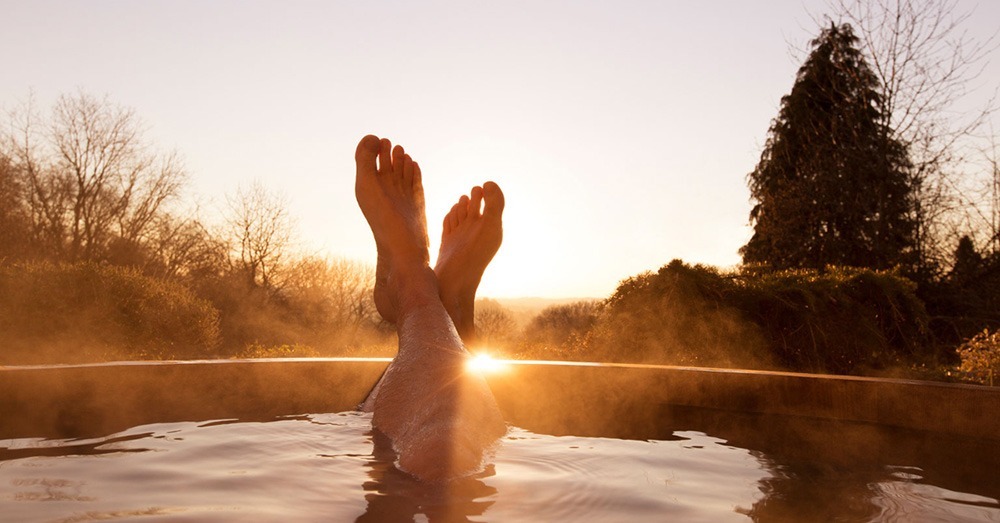Hot tubs offer a luxurious and therapeutic experience, allowing you to relax, unwind, and rejuvenate your body and mind. This article will examine the best soaking time for a hot tub. It will also discuss the advantages of using a hot tub. Finally, it will look at the precautions to take for a safe and enjoyable experience.
How Long Should You Soak In A Hot Tub?
Soaking in a hot tub can be a blissful experience. Still, it’s essential to consider the temperature of the water to determine the ideal soaking time. Follow the manufacturer’s guidelines for the recommended water temperature range.
- Adults
Adults should soak in a temperature between 100°F and 104°F (37°C to 40°C). The duration of the soak should be between 15 and 30 minutes. It is essential to take breaks to cool down.
Suppose the water is hotter than the recommended range. In that case, reducing your soaking time is advisable to avoid overheating or dehydration. Conversely, you can extend your soak if the water is colder than this range. This will compensate for the lower temperature.
- Kids
For young children ages 5 and up, use caution. The temperature should be Between 95 and 98 °F no more than 15 minutes. They also recommend children do not fully immerse themselves in hot water. For children under the age of 5, it is highly advised that they should not use the hot tub.
Children’s bodies are still developing and may have a lower tolerance for hot water temperatures than adults. Therefore, monitoring their comfort level, limiting their soaking time, and ensuring they stay hydrated during the hot tub session is essential
Consult With A Healthcare
Ultimately, deciding when a child can start using a hot tub varies. It should be based on their individual development, maturity, and overall health. Therefore, consulting with a healthcare professional or pediatrician for specific guidance tailored to your child’s needs is strongly recommended. They can provide the most accurate and appropriate recommendations based on the child’s age, health status, and specific considerations.
Pay Attention To Your Body's Signals
While enjoying your hot tub session, assessing your comfort level is essential. Each person has different preferences and tolerances regarding hot water immersion.
Pay attention to your body’s signals and adjust your soaking time accordingly. For example, if you start feeling uncomfortable, lightheaded, or excessively fatigued. This might mean you have been soaking for too long. Again, it is essential to listen to your body; don’t hesitate to shorten your soak or take breaks as needed.
Health Conditions
When using a hot tub, being mindful of your health is crucial. Suppose you have any pre-existing health conditions or concerns. In that case, it’s advisable to consult with your healthcare provider before establishing a soaking routine. They can provide personalized recommendations based on your specific health status.
Certain medical conditions may require precautions when using a hot tub. These conditions include cardiovascular issues, high or low blood pressure, and diabetes. In addition, your healthcare provider can guide you on the appropriate soaking time and any other considerations specific to your health.

How To Get In & Out Of A Hot Tub Safely
To ensure a safe and enjoyable hot tub experience, it’s recommended to follow a gradual warm-up and cool-down routine. This approach helps your body adjust to the temperature changes and minimizes the risk of dizziness or lightheadedness.
Start by sitting on the edge with your legs dipped in, gradually easing your body into the warm water. Similarly, when you finish your soaking session, give your body time to cool down before exiting the hot tub. These gradual steps allow your body to acclimate to the temperature changes, enhancing your overall experience and safety.
The Benefits of Soaking In A Hot Tub:
Hot tubs provide a tranquil environment that promotes relaxation and reduces stress. The warm water, soothing jets, and peaceful ambiance combine to create an oasis.
You can relax and forget your worries as the warm temperature will relax your muscles and release tension. You will experience a deep sense of calm and tranquility.
The warm water and hydrotherapy jets work together to massage your body. This further improves the relaxation experience.
Ease Body Soreness
One of the significant benefits of hot tubs is their ability to relieve muscle and joint pain. The warm water helps increase blood flow to your muscles and joints, alleviating stiffness and reducing inflammation.
The jets in the hot tub create a hydrotherapy effect, targeting specific areas of discomfort and providing a soothing massage. As a result, hot tubs can help ease muscle and joint discomfort, whether from physical activity or chronic pain. This can improve your overall well-being.
Overall Well-Being
Hot tubs offer many benefits to your overall well-being. Spending time in a hot tub can benefit your physical and mental health. It can help relieve muscle and joint pain, relax you, and reduce stress and anxiety levels. It can also improve your sleep quality and circulation.
Additionally, hot tubs provide social and family bonding space, improve skin health, and increase flexibility. So, indulge in the warmth and serenity of a hot tub to experience these benefits and enhance your quality of life.
Precautions and Things to Avoid in a Hot Tub:
One must be mindful of specific safety considerations when using a hot tub to ensure a pleasant and secure experience. One of the main factors to keep in mind is excessive heat exposure. Prolonged exposure to high temperatures can lead to overheating and dehydration. To prevent this, here are some safety guidelines to consider.
- Limiting your soaking time to 15-20 minutes and taking breaks to cool down is recommended.
- Hydrate yourself adequately by drinking water before and after using the hot tub.
- Alcohol and drug consumption should be avoided while using a hot tub. These substances can impair judgment, coordination, and reaction time, increasing the risk of accidents and injuries. It’s best to enjoy the hot tub in a clear-headed state to ensure your safety and that of others.
- Submerging your head in the water should also be avoided to prevent drowning or respiratory problems. Keeping your head above the water level allows you to breathe freely and reduces the risk of inhaling water.
- If you have long hair, tie it up to avoid entanglement with the jets or drains.
- Engaging in strenuous activities in the hot tub is not recommended. Vigorous movements can lead to overexertion, muscle strain, or even accidents. Therefore, using the hot tub for relaxation rather than intense physical exercise is advisable.
- Maintaining proper water chemistry and cleanliness is crucial for a safe and hygienic hot tub environment. Regularly check and adjust the water’s chemical levels, such as pH and sanitizer levels, to prevent bacteria or algae growth.
- Clean the filters regularly and drain and refill the hot tub as the manufacturer recommends.
- Avoid overcrowding the hot tub to ensure everyone has enough space and to prevent accidents. Overcrowding can lead to accidental bumps or falls, increasing the risk of injuries. Instead, follow the manufacturer’s guidelines regarding the maximum number of occupants for your hot tub model.
- Lastly, being aware of open wounds, infections, or contagious conditions before using a hot tub is essential. Open wounds can be susceptible to infection, and certain infections or contagious conditions can be spread through the water. If you have any of these conditions, it’s best to refrain from using the hot tub until you fully recover.

